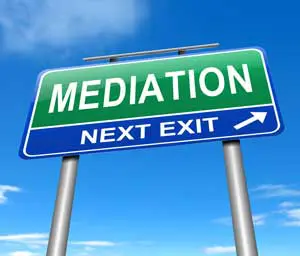While there are certainly divorcing spouses who can barely stand to be in the same room with one another, a large number of those going through a divorce will have a better outcome if the case is resolved through compromise and agreement rather than a long, drawn-out litigation. Mediation allows this to happen through the facilitation of resolutions which both parties are satisfied with. In fact, there are numerous advantages of mediation over court litigation when resolving disputes among divorcing couples.
Benefits of Mediation
Many of those who have successfully gone through divorce mediation note it is a much less expensive alternative to litigation. The costs of litigation are generally an unknown until the case settles. At that time the spouses may be shocked at the level of fees they have incurred through attorney’s fees, expert witnesses, depositions, preparation of the case for trial, filing motions back and forth and many other things associated with divorce litigation. Mediation, on the other hand, allows couples to have a good estimate of the number of hours it will take to resolve the issues at hand. The ultimate goal of mediation is to resolve the issues quickly, and this translates to financial savings.

Request a Free Consultation
Mediation is much less formal than courtroom litigation. Rather than being bound by courtroom etiquette and being under the burden of the technical rules of evidence, those involved in the mediation are seated around a table or in an informal office setting. The issues in question are discussed in a non-intimidating, non-threatening manner. Solutions and settlement options which are agreed to by both parties are the hallmarks of successful mediation. Mediation solutions also tend to be much more creative than the solutions which arise from litigation. The mediator will “brainstorm” with both spouses in order to arrive a good solution for each issue. So long as there are no violations of Florida laws, the final mediated agreement can be anything the spouses agree to with the help of their mediator.

Litigating a divorce results in both parties operating under attack and defend mode. When mediation is used, the process is much more peaceful and conciliatory. Both parties are allowed to explain their position and perspectives on all the issues, leading to a generation of solutions which ultimately benefit both spouses and their children, if any. Parties to divorce mediation have decision-making powers and must agree to each provision in the final agreement. Couples who agree to terms voluntarily are much more likely to comply with those terms in the future, and much less likely to find themselves back in court fighting about perceived violations of the terms.
Mediation is confidential and private, as opposed to divorce litigation, in which little privacy is afforded. Whatever goes on in mediation remains private, while grievances aired in a courtroom become part of the court record and are public. Any communications between parties during mediation are confidential with certain exceptions. These exceptions include child or elder abuse or one party talking about a crime they committed or one they intend to commit. The confidentiality of the mediation process allows spouses to speak openly and directly to one another without the fear something they say will be used against them.
Couples who are headed for a trial date may be ordered by the court to go through mediation before that date is set, however, mediation can also be voluntary. If the couples are unable to resolve their issues through mediation, they are free to pursue any other remedies they choose. Mediation is generally better for the children involved, as it allows the couple to make decisions which are in the best interests of the entire family in a non-contentious manner. Children can be damaged by hearing their parents argue and say things to one another that children should not hear. Many parents who end up litigating their divorce are not hesitant to say ugly things about the other parent in front of the children. Parents who make a conscious decision to mediate their divorce, are also more likely to be aware of ensuring the children are not privy to contentious behavior between the parents.
In the end, spouses who go through divorce mediation are much more likely to be satisfied with the final results. During a litigated divorce, neither spouse is likely to get what they asked for, leaving at least one of them angry and bitter over the outcome. When the final award is totally unexpected, that anger and bitterness only increase. Such a decision can leave that spouse feeling powerless and victimized. He or she may feel the judge was biased, and the settlement was far from fair or equitable. Mediation limits the feelings of victimization, even when the financial settlement is relatively modest.
Potential Disadvantages of Divorce Mediation
Although the advantages of mediation generally far outweigh the disadvantages, there are a few potential disadvantages associated with divorce mediation. A divorce mediator may not advise you on the legal aspects regarding the decisions you are making. This could result in an agreement which leads to a loss of important rights. This is why all mediated agreements should be looked at by an experienced divorce attorney prior to giving it to the judge for approval.
In a very limited number of divorce mediations, one spouse feels the mediator favors the other spouse. In such a case resolution is unlikely to occur. If a spouse is concealing issues during mediation, the mediator cannot compel him or her to reveal such things as accurate assets or income. In contrast, an attorney can depose the spouse, require financial information or even counsel the client to hire a forensic accountant. Divorce mediators don’t have the authority a judge has, meaning the success of the mediation is wholly dependent on the cooperation between the parties.
Misperceptions Regarding Divorce Mediation
In some cases, a spouse may be reluctant to attend mediation due to misperceptions they have regarding the mediation process. One party may feel the mediator will decide crucial issues without input. In reality, a divorce mediator cannot compel either spouse to do—or refrain from doing—anything. Others may feel a mediator can single-handedly “fix” all issues in the divorce. If one spouse fails to disclose all relevant facts related to the case, the mediator will be unable to achieve real results. In some cases, women may feel their husband will fare better during the mediation.
This is based on the outdated belief that women know less about the marital finances than their husbands, therefore will not be left with a favorable outcome in the divorce. It is important to remember divorce mediators are neutral and have no interest in either spouse “winning.” Finally, most people believe couples who are barely speaking could not possibly benefit from divorce mediation. Divorce mediators are highly trained in alternative dispute resolution and are skilled at working with those who have significant levels of anger between them. Obviously, both parties will be required to speak at some point, but the divorce mediator may be able to help that happen.
How Much Will My Florida Mediation Cost?
The cost of mediation may be based on Florida Statutes which provide a reduced rate for couples with a combined income of less than $100,000. Both parties will file a financial affidavit in order to establish the exact fees for divorce mediation. A Florida judge may waive mediation requirements but generally will not do so. Costs associated with divorce mediation may include the mediation costs, filing fees, recording fees, and service of process fees if the mediation is court-ordered. These fees may be levied against the non-prevailing parent if the court determines that parent is able to pay.
Mediation for Divorcing Couples with a Business
Divorcing spouses who have a business may find it even harder to ensure their business continues to run smoothly during this difficult time. Family issues can intrude into the workplace, and if the business is shared by one spouse’s family, the tensions can increase exponentially. In this instance, divorce-mediation can help the spouses sort through the issues related to the business without costly litigation which also compromises the future of the business.
A business which is the sole source of the couple’s income could end up shut down if the couple is unable to discuss the issues related to the business. This could lead to both parties suffering financially. A divorcing couple with a business can enter divorce mediation and may be able to come up with a compromise which could potentially save the business. Even if every little detail is not agreed upon, the mediator will attempt to get the couple to work together for the good of the business.
Preparing for Mediation
When a couple has made the decision to enter into divorce mediation, there are preparations which can be made which will ensure the mediation is more beneficial to both parties. Having an experienced divorce attorney in your corner is important before you attend mediation. Because a mediator is unable to give legal advice to either party, your legal questions can then be answered by your attorney. Before attending mediation, it is a good idea to make sure you are organized. This means having all documents pertaining to the issues you will be discussed together in a cohesive manner and bringing those documents to mediation.

Some find it helpful to make a list of marital events, in the order they occurred, as well as a list of the current disputes and another list of the outcomes you would like to see. Whether you put it on paper or not, have a list in your head of which issues are most important to you and which are the least important. Being prepared and on time is key to the success of the divorce mediation. You must also be prepared to talk to your spouse. If you have had trouble communicating in the past, your mediator will be there to facilitate communication. While it is important that you set goals regarding what it will take to resolve the case or the individual disputes, it is equally important you remain flexible. You may be surprised at some of the things you find out during mediation which change your perception of the entire issue.
What Will Occur During Mediation?
Each divorce mediator will have his or her own approach, however, some of the basics will likely remain the same. You will probably speak to the mediator on the phone, providing information about your marriage your family and the issues at hand. Some mediators will ask you for a great deal of information, while others may prefer to stick with the basics until meeting both parties. During the first meeting, the mediator will explain how the divorce mediation process will proceed. All parties may meet in the same room at all times, or the mediator may meet with each party separately at least one time.

All divorce mediators will work hard to put everyone at ease, allowing the process to proceed in an informal, comfortable atmosphere. Most divorce mediations last from two to five sessions. While these sessions are structured to address specific issues in a specific order, one party or the other may need to gather additional information or consult with their attorney. In this case the specific issue may be skipped, and readdressed later. If both spouses agree, other professionals such as child psychologist, accountants or attorneys may be allowed to attend the mediation in order to clarify specific issues. If both parties agree, a relative or trusted friend may attend mediation, however their participation in the process is extremely limited. Children may be present during later sessions if the parents agree, but rarely during the first session.
A High Rate of Success for Couples Who Engage in Divorce Mediation
All in all, when a couple is committed to making divorce mediation work, the likelihood of success is high. No matter how you currently feel about your spouse remember how you once felt, and try to end your marriage on the most positive note humanly possible rather than with bitterness and acrimony. Mediation can help you achieve this goal by offering a safe place to discuss your disputes as well as gentle guidance to help you solve those disputes.
Attorney Howard Iken is a Supreme Court Certified Family Law Mediators. We offer divorce mediation in our Tampa, New Port Richey, and Orlando offices. Call us to arrange a mediation at 844-655-0191
